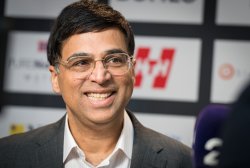
How the world changed since Anand changed the world of chess
05.02.2024 05:33 | HistoryAs Viswanathan Anand rose to prominence in the world of chess, becoming a symbol of consistency and excellence in Indian chess, the world around him underwent dramatic transformations.
His journey from a young chess prodigy in the 1980s to a world champion and a legend of the game has paralleled significant global and technological changes, societal shifts, and milestones in sports and culture.
The World in Transition
The Fall of the Berlin Wall and German Reunification:
When Anand began making waves in international chess in the 1980s, Germany was a nation divided by the Berlin Wall, symbolizing the Cold War's ideological divide. The fall of the Berlin Wall in 1989 and the subsequent reunification of Germany in 1990 were watershed moments in world history, signaling the end of the Cold War and the beginning of a new era in European politics.
The Advent of the Internet:
In the early days of Anand's career, the internet was in its infancy, far from the ubiquitous presence it is today. The World Wide Web was proposed by Tim Berners-Lee in 1989 and publicly launched in 1991, revolutionizing how people access information, communicate, and entertain themselves. The internet has since transformed how chess is played, studied, and followed, with online platforms, streaming, and digital learning becoming integral to the chess community.
The Reign of Garry Kasparov:
During Anand's ascent in chess, Garry Kasparov was one of the dominant figures in the game. Kasparov became World Chess Champion in 1985 and held the title until 2000, his reign coinciding with the early part of Anand's career. Kasparov's battles against contemporaries like Anatoly Karpov and later against IBM's Deep Blue computer were significant events that captured the public's imagination and brought chess to a wider audience.
Sir Alex Ferguson's Legacy:
In the realm of football, Sir Alex Ferguson was appointed manager of Manchester United in 1986, embarking on a journey that would lead to him becoming one of the most successful and respected figures in the sport. Ferguson's tenure at Manchester United, which lasted until 2013, saw the club rise to the pinnacle of English and European football, paralleling Anand's own journey to the top of the chess world.
A World of Change
As Anand remained a steadfast figure in Indian chess, the world saw the rise of new powers, the end of longstanding conflicts, technological revolutions, and the emergence of global cultural phenomena. The digital age brought about a new era of connectivity, with the internet and mobile technologies reshaping every aspect of daily life. Social media platforms emerged, changing how people interact and form communities.
The global political landscape shifted with the end of apartheid in South Africa, the dissolution of the Soviet Union, and the expansion of the European Union. These changes reflected a world becoming increasingly interconnected yet facing new challenges and complexities.
In sports, the period saw the rise of iconic athletes across disciplines, from Michael Jordan in basketball to Serena Williams in tennis, each pushing the boundaries of their sport. Similarly, in chess, Anand's reign saw the emergence of new talents like Magnus Carlsen, marking a generational shift in the game.
Conclusion
Viswanathan Anand's career is a remarkable testament to endurance and excellence in a world of constant change. While he remained focused on the 64 squares of the chessboard, achieving unprecedented success for an Indian chess player, the world around him evolved, presenting new challenges and opportunities. Anand's journey mirrors the story of a changing world, one that has seen barriers fall, new technologies emerge, and global culture evolve, all while the game of chess continued to fascinate and inspire millions around the globe.
